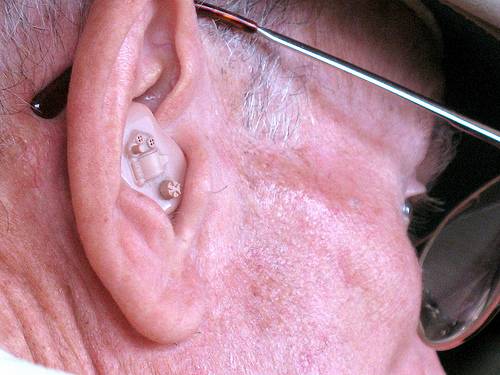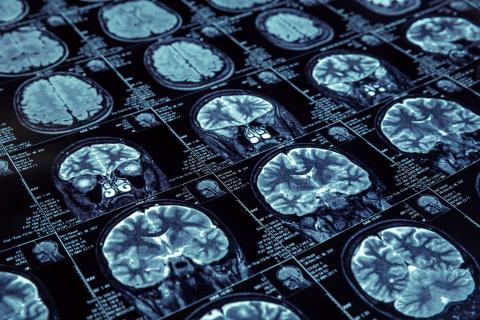Reactions: Hearing aid use reduces risk of dementia in hearing-impaired people
A Lancet Commission study in 2020 estimated that hearing loss is associated with 8% of dementia cases worldwide. Now, a paper has analysed data from more than 400,000 people collected at the UK Biobank. Their findings show that the risk of developing dementia is 42% higher in people with hearing problems, but this increased risk disappears in those who use hearing aids. According to the authors, whose work is published in The Lancet Public Health, the data "highlight the urgent need to introduce hearing aids early when someone starts to experience hearing problems".

Audífonos - Dening (EN)
Tom Dening
Professor of Dementia Research at the University of Nottingham
This is a timely and important paper. There has been a lot of interest in hearing conditions and their possible contribution to the risk of developing dementia in recent years and it is estimated that hearing may account for about 8% of the potentially modifiable risk of developing dementia. This then raises the question as to whether treating hearing loss will actually make a difference to a person’s future risk of developing dementia.
It is difficult to do convincing studies to explore this question as you need large samples and long enough periods of follow-up. However, the evidence is beginning to emerge to support the notion that the humble hearing aid can do much to fight the giant Dementia. This paper is an important contribution. Using data from nearly half a million participants in the UK Biobank, an international team of researchers found that people with untreated hearing loss had a 42% increased risk of developing dementia compared to people without hearing problems. However, for people with hearing impairment but who used hearing aids, their risk of dementia was almost the same as for people with normal hearing.
The paper also explores some of the possible reasons as to how hearing aids may work, tending to favour the idea that they are effective because they reduce the cognitive effort involved in hearing and/or they reduce the effects of sensory deprivation if you can’t hear. The data provided less support or the idea that hearing loss-related dementia risk is mediated by social withdrawal and isolation.
As someone has recently started to use hearing aids myself, I am greatly encouraged by these findings, and as a clinical researcher I appreciate having better data on which to base my advice to patients. We need to use studies like this to encourage the public not to be embarrassed by hearing problems and to seek assessment and treatment sooner rather than later.
Audífonos - Marshall (EN)
Charles Marshall
Professor of Clinical Neurology, Queen Mary University of London
This study provides high quality evidence that those with hearing loss who use hearing aids are at lower risk of dementia than those with hearing loss who do not use hearing aids. This raises the possibility that a proportion of dementia cases could be prevented by using hearing aids to correct hearing loss. However, the observational nature of this study makes it difficult to be sure that hearing aids are actually causing the reduced risk of dementia.
Hearing aids produce slightly distorted sound, and the brain has to adapt to this in order for hearing aids to be helpful. People who are at risk of developing dementia in the future may have early changes in their brain that impair this adaptation, and this may lead to them choosing to not use hearing aids. This would confound the association, creating the appearance that hearing aids were reducing dementia risk, when actually their use was just identifying people with relatively healthy brains.
Hopefully the evidence from this paper will lead to randomised trials of hearing aid use that will provide a stronger foundation for public health advice about whether correcting hearing loss might help to prevent dementia.
Audífonos - Griffiths (EN)
Tim Griffiths
Professor of Cognitive Neurology
The numbers are impressive and have allowed authors to assess multiple factors that might affect dementia risk apart from hearing loss. But this observational study needs to be interpreted with caution. The best quality data on the relationship between hearing loss and dementia were the studies included in a model developed by the Lancet Commission based on hearing tests (audiograms) and follow up of the patients to see if they developed dementia. The UK biobank data do not include hearing tests: the hearing data are based on self-report which is not reliable. Hearing aid effects are difficult to interpret for two reasons:
- people who have hearing aids often tend not to use them (although that would work against the effect of hearing-aid use shown here);
- it is difficult to be certain if association of not using hearing aids reflects dementia causing lower hearing aid use as opposed to the reverse.
So, the suggested effect is interesting but we really need are prospective studies of hearing aid use that measure deafness like the Lancet Commission studies and carefully evaluate device use and incident dementia. There is a large multisite US study funded by NIH currently doing just that.
Jiang et al.
- Research article
- Non-randomized
- Observational study
- People



